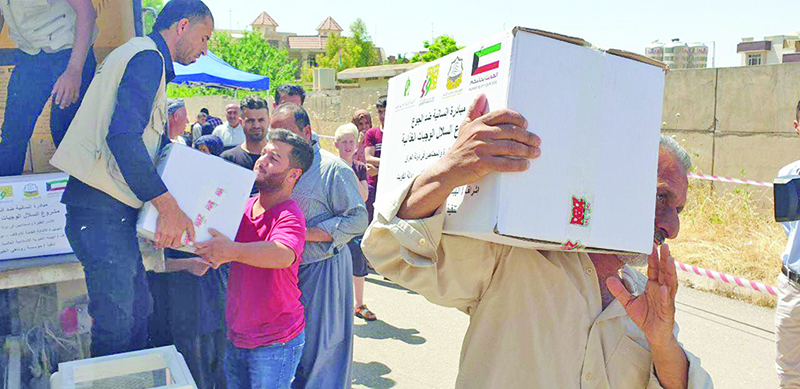
KUWAIT: Kuwaiti
institutions and organizations have continued to locally and internationally
provide relief assistance to refugees, displaced people and the needy during
Eid Al-Fitr. The help Kuwait provided for health and education during the week
ended on Friday in Jordan, Iraq and the Gaza Strip. In Jordan, the Kuwait Fund
for Arab Economic Development (KFAED) signed a fourth grant agreement for the
King Hussein Cancer Center (KHCC) worth $2 million to treat Syrian refugees
suffering from cancer in Jordan.
It was signed by
KFAED's Director-General Abdulwahab Al-Bader, and the Jordanian side, the
Chairperson of the Board of Trustees of KHCC, Princess Ghida Talal, in the
presence of Kuwaiti Ambassador to Jordan Aziz Al-Deihani and senior officials
of KFAED. Bader said after the ceremony at the KHCC in Amman that the total in
collaboration with the Center amounts to $5 million. The current grant is part
of Kuwait's commitments to support the Syrian refugees announced at the fourth
International Donors Conference, he explained.
KFAED provided
three prior grants to the KHCC for humanitarian assistance to Syrian refugees;
first grant was signed in 2016 with a value of $1 million, the second and the
third signed in 2017 and 2018 with the same value each, he said. Previous
grants from the KFAED helped about 117 Syrian refugee cancer patients, Bader
pointed out. The grant agreement aims to fund the costs of diagnosing the
patient through laboratory tests, chemotherapy, bone marrow transplantation and
surgeries, Al-Bader said.
In the meantime,
Princess Ghaida Talal thanked KUNA for the support to the KFAED and spreading
KHCC's message. KHCC treats patients from all over the world, providing the
best and latest treatments according to international standards, recently
placed on the top ranks in developing countries and sixth globally in terms of
specialization in cancer treatment, she said. KFAED toured KHCC to learn about
its advanced equipment used in treating cancer patients and visited Syrian
refugee children.
Meanwhile in the
Gaza Strip, the association for disabled families in the Gaza Strip distributed
medical aid and equipment to hundreds of people with special needs in the
Kuwait emergency health relief project for the disabled in the Gaza Strip.
Chairperson of International Islamic Charitable Organization (ICCO) Heba Adwan
said in a statement that the project targeted about 1500 people with special
needs suffering from various disabilities.
The aid included
vehicles for disabled people, medical devices, as well as providing medical
care through a mobile medical clinic. The project comes in the context of the
eagerness of the Secretary-General of Awqaf and Zakat House in Kuwait to
alleviate the burden of Palestinian citizens from the Israeli siege and harsh
economic conditions, coming at a time when various institutions are
unsupportive, she added.
Adwan underlined
that the implementation of the project reflects the Islamic and national
responsibility of aiding and thanked Kuwait, the Amir and the government. Then
in Iraq, Kuwait's Consul-General in Erbil Omar Al-Kanderi supervised the
distribution of 15 tons of foodstuffs provided by the Secretary-General of
Awqaf and the International Islamic Charitable Organization (IICO) in Kuwait to
the disabled. Kanderi said that this aid comes within the framework of the
Kuwaiti campaign launched by His Highness the Amir Sheikh Sabah Al-Ahmad
Al-Jaber Al-Sabah to alleviate the suffering of Iraqis.
Various
assistance provided by Kuwait to Iraqis will continue and vary to include all
segments of society, he pointed out. In a similar statement, Omar Talal is
thankful for Kuwait's humanitarian organizations, pointing out that 576 food
baskets were distributed to people with special needs in Erbil. At the start of
Ramadan, over 10 thousand meals were given to the needy, workers and students
in the Kurdistan region. This was given by IICO who distributed food baskets to
displaced Iraqis from camps, totaling to aiding 3,507 families of Nineveh that
has a population of 17,300.
At the local
level, the Kuwait Red Crescent Society (KRCS) said Al-Bayan Bilingual School
(BBS) students raised donations of KD 49,000 (about $161,000) to children of poor
families inside Kuwait who cannot pay tuition fees.KRCS Chairman Dr Hilal
Al-Sayer said that the aim of the donation is to encourage students to
participate in voluntary charitable work, thankful of the leadership
responsibility students took such as Hussa Al-Kharafi.
Kharafi said that
BBS places education as a social priority because it is the foundation for the
development and building of societies, adding that the project aims to raise a
knowledgeable generation. The student is glad that BBS is donating, recalling
the school's success last year in donation, encouraging those wishing to donate
to take this step. Contextually, the KRCS collaborated with Avenues to continue
the campaign to provide nurseries for newborns in Yemen, ending on June 16.
KRCS
Secretary-General Maha Al-Barjas said that the donation campaign was welcomed
by Kuwaitis and many donated to support the children in Yemen. Despite the
availability of screening, diagnosis and maternity programs by health
authorities in Yemen, early births of undeveloped children are still a huge
issue. This could hinder the delivery of reproductive health services and
supplies, hazardously affecting mothers and their children, the UN Population
Fund (UNFPA) said. The Avenues Mall allocated two cash donation machines in the
Grand Plaza area, as well as an electronic payment link to facilitate the
donation process, underlining that it gets sent to the special account of KRCS,
Barjas pointed out. - KUNA










